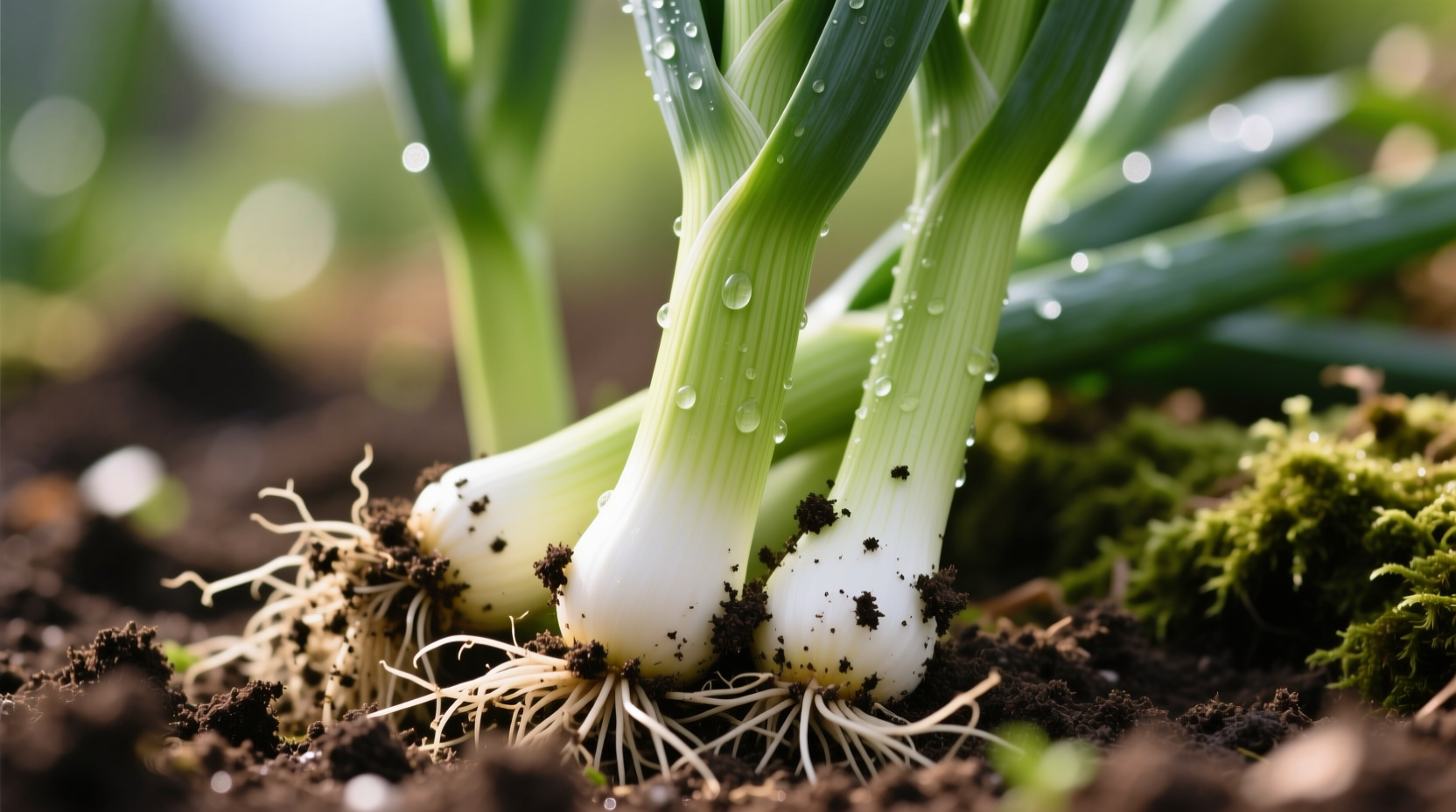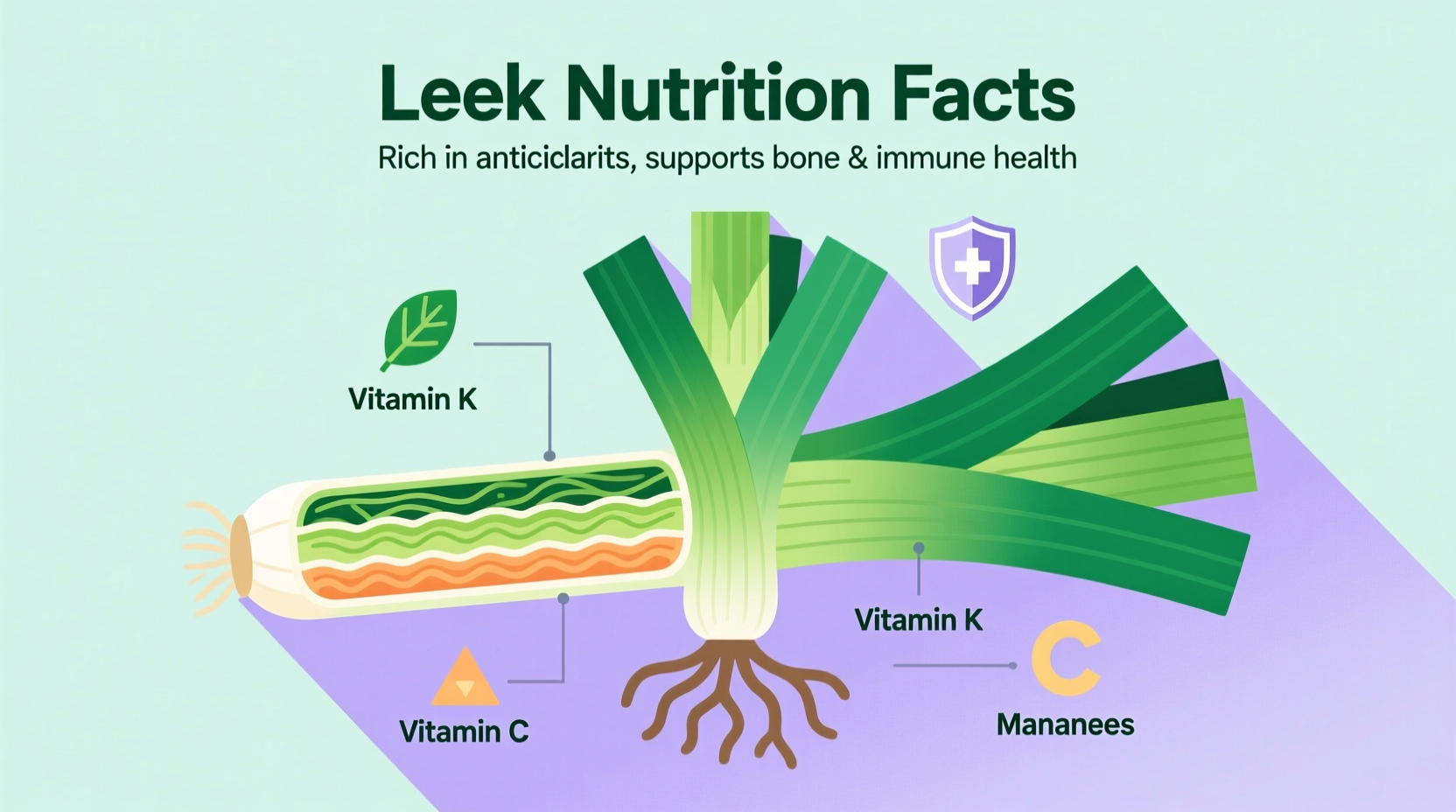Discover why this underrated member of the allium family deserves a permanent spot in your kitchen. Whether you're managing dietary restrictions, seeking heart-healthy foods, or simply expanding your vegetable repertoire, understanding leek nutrition unlocks practical benefits for everyday cooking and long-term wellness.
What Makes Leeks Nutritionally Unique
Unlike their sharper cousins onions and garlic, leeks offer a milder flavor profile while delivering comparable nutritional advantages. The white and light green portions we commonly eat contain concentrated nutrients that support multiple body systems. According to USDA FoodData Central, a standard 89g serving of cooked leeks provides essential nutrients without overwhelming your daily calorie budget.
| Nutrient | Per 100g Raw | Percent Daily Value |
|---|---|---|
| Calories | 61 | 3% |
| Carbohydrates | 14.15g | 5% |
| Dietary Fiber | 1.8g | 6% |
| Vitamin K | 47μg | 33% | d
| Vitamin A | 160μg | 16% |
| Vitamin C | 12mg | 15% |
| Folate | 64μg | 16% |
| Manganese | 0.2mg | 8% |
Data source: USDA FoodData Central
Health Benefits Backed by Research
Leeks contain organosulfur compounds similar to those found in garlic and onions, which research suggests may help reduce inflammation and support cardiovascular health. A 2020 review published in Nutrients highlighted how allium vegetables' antioxidant properties, particularly kaempferol in leeks, demonstrate potential protective effects against chronic diseases.
The substantial vitamin K content in leeks plays a crucial role in blood clotting and bone metabolism. Just one cup of cooked leeks provides more than your daily requirement, making them valuable for maintaining skeletal health as you age. Meanwhile, the combination of vitamin C and flavonoids supports immune function and skin health through collagen synthesis and antioxidant protection.
| Vegetable Comparison (Per 100g) | Leeks | Onions | Garlic |
|---|---|---|---|
| Calories | 61 | 40 | 149 |
| Carbohydrates | 14g | 9g | 33g |
| Vitamin K | 47μg | 0.4μg | 1.7μg |
| Vitamin C | 12mg | 7.4mg | 31.2mg |
| Manganese | 0.2mg | 0.13mg | 1.7mg |
This nutritional comparison shows why leeks stand out among allium vegetables for vitamin K content while offering a balanced nutritional profile suitable for various dietary approaches.
Practical Nutrition Applications
Maximize leek nutrition by incorporating both the white and light green parts into your meals. The darker green portions contain higher concentrations of certain nutrients but require longer cooking. For optimal nutrient retention:
- Steam or sauté rather than boiling to preserve water-soluble vitamins
- Pair with healthy fats like olive oil to enhance absorption of fat-soluble vitamins
- Include raw in salads when using the tender green tops for maximum vitamin C
- Combine with vitamin C-rich foods to improve iron absorption from plant sources
One cup of sliced leeks contains just 54 calories yet delivers significant fiber and multiple vitamins. This makes them ideal for volume eating strategies where you want to increase meal satisfaction without excessive calories. Their mild flavor works well in soups, quiches, stir-fries, and as a base for sauces.

Selecting and Storing for Maximum Nutritional Value
Choose leeks with crisp, dark green leaves and firm white bases. Larger leeks tend to be more fibrous but contain comparable nutrients to smaller varieties. Store unwashed leeks upright in the refrigerator with roots submerged in water to maintain freshness for up to two weeks.
Nutrient degradation occurs most rapidly in cut or prepared leeks. For maximum nutritional benefit, prepare leeks shortly before cooking. The vitamin C content decreases by approximately 15% after three days of refrigeration, while vitamin K remains relatively stable throughout proper storage periods.
Special Dietary Considerations
Leeks work well within multiple dietary frameworks:
- Keto diets: With just 6g net carbs per 100g, they fit within moderate carbohydrate restrictions
- Diabetes management: Low glycemic index (40) and high fiber content support blood sugar regulation
- Heart health: Potassium content (180mg per 100g) helps maintain healthy blood pressure
- Bone health: Exceptional vitamin K levels support calcium utilization and bone density
People taking blood thinners should maintain consistent leek consumption rather than dramatic increases or decreases due to the high vitamin K content, which affects blood clotting mechanisms.
Frequently Asked Questions
Here are answers to common questions about leek nutrition based on current nutritional science:











 浙公网安备
33010002000092号
浙公网安备
33010002000092号 浙B2-20120091-4
浙B2-20120091-4